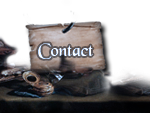03.06.2009 20:48
[Interviews (english)]
Storyinterview
Dear friends!
We - Piranha Club and World Of Risen - want to call your attention to the long-awaited interview with the creation group of Piranha Bytes. You know these people very well - Bjorn Pankratz, Stefan Kalveram and Mattias Filler.
Interview with the creation group of Piranha Bytes. Part 1.
How we can become a script writer? What we should start from?
Do a script writer need to have vocational education? Can something like that to help to work?
Bjorn: No. There is no special education for that.
Mattias: Of couse, good knowledge of language, the game develops on, is welcome. And also it's very important is to show interest to some sort of stories and to how they are told.
Bjorn: We all were "role-players" and came out from Pen & Paper role-playing games. Main methods of the script development also descend from this sphere.
Stefan: With its help you can learn the srtucture of game scripts. For example, any hero in any role-playing game must to have an antagonist who a hero should defeat. In essence, we not only played in Pen & Paper games, but we leads them. Being the game group presenter, you can find out a lot.
Bjorn: It's true, when you are Master, you knows very well how a game script are created. There are many differences between us and story in a book. Sure, you can leads narration as the story in a book, but such method don't matches to role-playing games, for players in
that case should be very limited and they can act within the limits of a given event stream. You studies to tell stories with table role-playing games in order to make them interesting to players.
Stefan: First of all, as Master you can see players reactions. You can sight what they like and what they bore. As script writers we also had to decide: how we can entertain a player, and at the same time prognose what he wants to do next. For example, we must to write dialogs for hero and to have in view what hero wants in this situation, and how he must to react on that. To earn experience relatively to what public accepts, and what - does not, how quests must be given to make them interested to players, and what sort of quests player likes - this is, perhaps, most important "education", you can took during time.
Bjorn: I also think that we earned a lot of experience in Pen & Paper games.
All of us played them. You studies from them what to do with a story turn, how can you keep players interest. What thing makes game so interesting that players receive pleasure of them? For example, you can bring new features, so "wave-like" action appears in the story. That means there are small culminations in the general course of story. Through them players feel some success and they motivate themselves to
continue the game.
Stefan: It's also important to make clear what story tell about. Everyone of us knows how good-forethought adventure can break, if player don't undestand what he must do. If guidances in game too transparant then in most of cases no one would undestand it. It must be clear what is next step.
How did you came to this job in Piranha Bytes?
Stefan: It was time when Piranha Bytes was taking on people to test the game. It was chance for us to join at PB. We - in trio - started from quality control in Gothic 1 development. This was not planned as start of carrier in game industry, but - we can say - we " thrust through foot in door."
Bjorn: I should mention, perhaps, that we worked for half a year as testers for 100 hours in week. It was big stress, it was very boring.
Stefan: In that time many prerequisite was based. At first we knew a lot - from techical point of view - about how the game functions. Then we took more and more tasks and step by step reached deeper and deeper. And because of work we mastered our knowledge.There are many advises to write ga,e script. Are there good sourses for this?
Mattias: Well, I remember nothing of it. And it's not so important to read them. Something from them is right, but you can't rely on that there are only truth on the page read by you. But it's same for many things, that you can read in Internet.
Bjorn: Good idea is to focuse to game titles in which there is interested plot.
If someone wants to become script writer, he should always ask himself why one or another story is interesting, and what basic ideas hide in it.
Stefan: Yeah. I think so way. Good plot in PC-game lives by not only story. Game lives by mechanics first of all, namely by that how this story are telling. It can be sight in other games analysing them.
Are there any differences between film-script and game-script? Linda Seger's book "How can you make good script the best" is almost Bible for those who work in cinematography and write scriptes. Do you know this book? If yes, what do you think about it?
Bjorn: No, we don't know with this book. We use our own quite practise methode. For example, I personally saw all possible films of 80th years, 80% of 90th, and now I step by step go to 40% of films that realised after 2000. I thought I have saw a lot of films. Perhaps, I could guess every scene from 80th films. Very long time I was peculiar cinema-freak and I think it's same for all of us. But you must not forget that scripts in films in some points are very different from RPG scripts. In film stress curve can be different. In the end of film there is usually only one culmination, or you can use a guess effect, recognition. In RPG you can't lead up all game to that. It will not work out. In role-playing game there are small stories to make player again and again feel success. Player is rewarded for that he defeat monster or rescue another character and small story ends.
Mattias: Constant small feelings of success are perhaps one of PC-games bases. It is necessary to motivate the player constantly. It is impossible to submit scenes precisely as in a film. In a film the history is told in certain sequence, and the film will always follow this order. In game business is a little differently. Namely in role-playing game it is not defined that the player will undertake during the following moment. Situations should be constructed so that it in any order has come to the purpose. Not important that it has made before or has not made, despite it the situation should work.
Bjorn: In a film also it is possible to work much with emotions. It functions also in a linear shooter. Thus, for example, it is possible to work with effects of a shock. We take, for example, F.E.A.R. There the simple history which also or nearly so as could be told in a film is told.
Experiences of success of the player consist that he has passed on the following level or has overcome opponents who wished to kill him. In our games it a little differently. We have open world on which it is possible to move freely. Various places in game can be visited in a free order. In game there are people who have personal efforts and problems which the player tries to resolve. It all time obtains a certain reward: gets the teacher in the name of NPC or receives an interesting subject.
Therefore both that and another [films and games] hardly can be compared.
Stefan: Also one of the main distinctions with films, it that in them often there are scenes in which the main character does not appear. From them the spectator receives additional information, for example during conversation of two minor characters. In game as a rule, it is not present. Here protagonist is always in focus. It means that if something occurs around, it must somehow to show to player.
Mattias: In the book or a film you are the spectator. In game you actively interfere with an event. You are one who operates all oneself, who actively makes decisions. It means much higher degree of an identification of with the character since the player specifies to the antagonist where to go and what to do, and also operates in compliance with the conscience and gives to the character the aspirations.
Interviewers: elind, Savol, Odin68 (Piranha Club) and Meditate (World Of Risen).
Translation to english by SonnedreS
We - Piranha Club and World Of Risen - want to call your attention to the long-awaited interview with the creation group of Piranha Bytes. You know these people very well - Bjorn Pankratz, Stefan Kalveram and Mattias Filler.
Interview with the creation group of Piranha Bytes. Part 1.
How we can become a script writer? What we should start from?
Do a script writer need to have vocational education? Can something like that to help to work?
Bjorn: No. There is no special education for that.
Mattias: Of couse, good knowledge of language, the game develops on, is welcome. And also it's very important is to show interest to some sort of stories and to how they are told.
Bjorn: We all were "role-players" and came out from Pen & Paper role-playing games. Main methods of the script development also descend from this sphere.
Stefan: With its help you can learn the srtucture of game scripts. For example, any hero in any role-playing game must to have an antagonist who a hero should defeat. In essence, we not only played in Pen & Paper games, but we leads them. Being the game group presenter, you can find out a lot.
Bjorn: It's true, when you are Master, you knows very well how a game script are created. There are many differences between us and story in a book. Sure, you can leads narration as the story in a book, but such method don't matches to role-playing games, for players in
that case should be very limited and they can act within the limits of a given event stream. You studies to tell stories with table role-playing games in order to make them interesting to players.
Stefan: First of all, as Master you can see players reactions. You can sight what they like and what they bore. As script writers we also had to decide: how we can entertain a player, and at the same time prognose what he wants to do next. For example, we must to write dialogs for hero and to have in view what hero wants in this situation, and how he must to react on that. To earn experience relatively to what public accepts, and what - does not, how quests must be given to make them interested to players, and what sort of quests player likes - this is, perhaps, most important "education", you can took during time.
Bjorn: I also think that we earned a lot of experience in Pen & Paper games.
All of us played them. You studies from them what to do with a story turn, how can you keep players interest. What thing makes game so interesting that players receive pleasure of them? For example, you can bring new features, so "wave-like" action appears in the story. That means there are small culminations in the general course of story. Through them players feel some success and they motivate themselves to
continue the game.
Stefan: It's also important to make clear what story tell about. Everyone of us knows how good-forethought adventure can break, if player don't undestand what he must do. If guidances in game too transparant then in most of cases no one would undestand it. It must be clear what is next step.
How did you came to this job in Piranha Bytes?
Stefan: It was time when Piranha Bytes was taking on people to test the game. It was chance for us to join at PB. We - in trio - started from quality control in Gothic 1 development. This was not planned as start of carrier in game industry, but - we can say - we " thrust through foot in door."
Bjorn: I should mention, perhaps, that we worked for half a year as testers for 100 hours in week. It was big stress, it was very boring.
Stefan: In that time many prerequisite was based. At first we knew a lot - from techical point of view - about how the game functions. Then we took more and more tasks and step by step reached deeper and deeper. And because of work we mastered our knowledge.There are many advises to write ga,e script. Are there good sourses for this?
Mattias: Well, I remember nothing of it. And it's not so important to read them. Something from them is right, but you can't rely on that there are only truth on the page read by you. But it's same for many things, that you can read in Internet.
Bjorn: Good idea is to focuse to game titles in which there is interested plot.
If someone wants to become script writer, he should always ask himself why one or another story is interesting, and what basic ideas hide in it.
Stefan: Yeah. I think so way. Good plot in PC-game lives by not only story. Game lives by mechanics first of all, namely by that how this story are telling. It can be sight in other games analysing them.
Are there any differences between film-script and game-script? Linda Seger's book "How can you make good script the best" is almost Bible for those who work in cinematography and write scriptes. Do you know this book? If yes, what do you think about it?
Bjorn: No, we don't know with this book. We use our own quite practise methode. For example, I personally saw all possible films of 80th years, 80% of 90th, and now I step by step go to 40% of films that realised after 2000. I thought I have saw a lot of films. Perhaps, I could guess every scene from 80th films. Very long time I was peculiar cinema-freak and I think it's same for all of us. But you must not forget that scripts in films in some points are very different from RPG scripts. In film stress curve can be different. In the end of film there is usually only one culmination, or you can use a guess effect, recognition. In RPG you can't lead up all game to that. It will not work out. In role-playing game there are small stories to make player again and again feel success. Player is rewarded for that he defeat monster or rescue another character and small story ends.
Mattias: Constant small feelings of success are perhaps one of PC-games bases. It is necessary to motivate the player constantly. It is impossible to submit scenes precisely as in a film. In a film the history is told in certain sequence, and the film will always follow this order. In game business is a little differently. Namely in role-playing game it is not defined that the player will undertake during the following moment. Situations should be constructed so that it in any order has come to the purpose. Not important that it has made before or has not made, despite it the situation should work.
Bjorn: In a film also it is possible to work much with emotions. It functions also in a linear shooter. Thus, for example, it is possible to work with effects of a shock. We take, for example, F.E.A.R. There the simple history which also or nearly so as could be told in a film is told.
Experiences of success of the player consist that he has passed on the following level or has overcome opponents who wished to kill him. In our games it a little differently. We have open world on which it is possible to move freely. Various places in game can be visited in a free order. In game there are people who have personal efforts and problems which the player tries to resolve. It all time obtains a certain reward: gets the teacher in the name of NPC or receives an interesting subject.
Therefore both that and another [films and games] hardly can be compared.
Stefan: Also one of the main distinctions with films, it that in them often there are scenes in which the main character does not appear. From them the spectator receives additional information, for example during conversation of two minor characters. In game as a rule, it is not present. Here protagonist is always in focus. It means that if something occurs around, it must somehow to show to player.
Mattias: In the book or a film you are the spectator. In game you actively interfere with an event. You are one who operates all oneself, who actively makes decisions. It means much higher degree of an identification of with the character since the player specifies to the antagonist where to go and what to do, and also operates in compliance with the conscience and gives to the character the aspirations.
Interviewers: elind, Savol, Odin68 (Piranha Club) and Meditate (World Of Risen).
Translation to english by SonnedreS




























